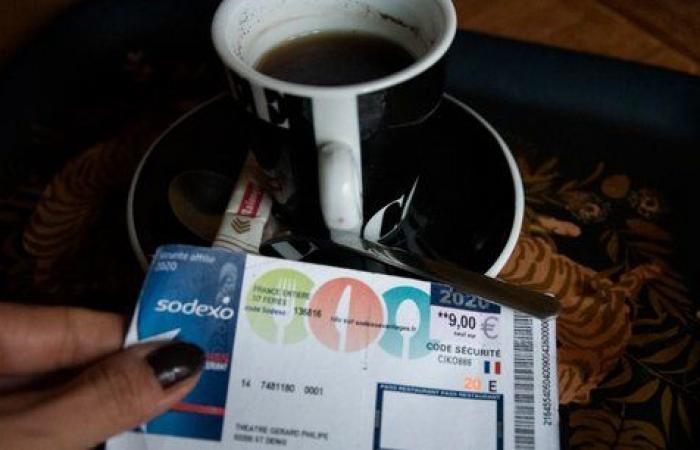The increased use of meal vouchers for shopping has made the body that supervises it, the National Commission for Meal Vouchers (CNTR), fear the disappearance of the system. This estimates that nearly 100,000 direct jobs depend on it, according to a study published this Monday.
The National Assembly on Wednesday urgently adopted the extension until the end of 2026 of the exemption which allows meal vouchers to be used to purchase all food products. An adoption which must still be confirmed by a vote in the Senate.
Or, « sIf the meal voucher is a little diverted from its purpose, there is the risk that the Court of Auditors will reconsider the exemption » charges, granted specifically to finance the employee's lunch break, explained to AFP Jean-Michel Rousseau, vice-president of the CNTR which involves all stakeholders in the system (employers, employees, traders , transmitters), and provides both an information, decision-making and control role.
Meal vouchers: MEPs extend use for shopping
40,000 jobs threatened
Based on figures from the CNTR and INSEE for 2024 and 2023, the study affirms that the system is “ a pillar for employment », supporting 76,000 direct jobs in the catering sector, and less than 7,500 in the food distribution sector. If the exemption were removed, the commission calculated that 40,000 jobs could disappear.
From an economic point of view, “ each euro invested by employers in meal vouchers generates 2.70 euros injected into the local economy ”, according to the study. This calculates that 14 billion euros directly benefited businesses and restaurateurs thanks to meal vouchers in 2023. Of this total, the study identifies “ 8.6 billion euros for traditional or fast food, the main beneficiary of the system ».
Restaurant: 11 pleas for the start of the school year
Meal vouchers are also “ a significant source of revenue for the State, which collects around 3 billion euros per year via VAT, social and employer contributions, as well as corporate and income taxes ”, according to the study. “ After deduction of specific exemptions granted, the net benefit for the State is estimated at 845 million euros per year », Underlines the study.
Adapt the ceilings to purchases
While Secretary of State for Consumer Affairs Laurence Garnier committed last week to opening discussions on a reform of meal vouchers from 2025, the CNTR wishes to make its contribution to the consultation.
The organization notably proposes the establishment of different ceilings, depending on whether the vouchers are used to purchase immediately consumable food preparations, or foods requiring preparation (pasta, eggs, fresh meat and fish, etc.), while maintaining a maximum daily limit of 25 euros so as not to make the meal voucher a disguised salary.
« Once authorization has been given to use restaurant vouchers for a purpose, it is difficult to go back », admits Jean-Michel Rousseau.
The increased use of teleworking also justifies greater flexibility in their use, underlines the CNTR. Other proposals: increase the face value of meal vouchers, “ to cover the real cost of a balanced meal, estimated between 12 and 19 euros depending on the regions and types of catering », or even increase the employers' share in co-financing (currently at 60%).
Restaurateurs are up in arms
The extension of the use of meal vouchers in supermarkets is not only frowned upon by the CNTR. Umih, the sector's leading employers' organization, notably criticized the idea of this measure last month. The extension to mass distribution is part of “scandal” and deprives restaurateurs of a windfall estimated at “576 million euros”assured its president, restaurateur Thierry Marx. He notably requested the creation of another parallel title “sustainable food” intended for mass distribution.
The other union in the sector, the Groupement des Hôtelleries & Restaurations de France (GHR), also pleaded not to “continue to direct all meal vouchers towards mass distribution”. The restaurateur Romain Vidal, in charge of the file within the GHR, had thus recommended “a double daily payment limit”. On the one hand, “a ceiling of 15 euros in supermarkets” and, on the other hand, “a ceiling of 25 euros in restaurants”.
Conversely, the position of the Fédération du Commerce et de la Distribution, the main employers' organization in the mass distribution sector, is quite different. The extension of meal vouchers responds to “ consumption habits [qui] evolve (preparing homemade meals for work, teleworking, etc.) for practical, social and economic reasons », Wrote its general delegate, Layla Rahhou, on the social network LinkedIn.
(With AFP)






